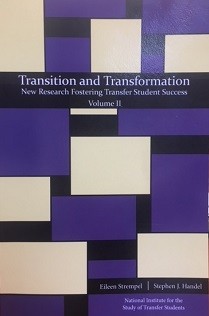
Research Demonstrates Value of Fostering Transition Student Success
Higher education is how we as a nation move the dial on systematic, economic inequality at scale, says Eileen Strempel, senior vice provost for academic affairs at the University of Cincinnati. Fixing the transfer process is absolutely essential. There is too much at stake, for our students, our communities and our country.
Strempel has co-authored a new book, alongside Stephen J. Handel, associate vice president for undergraduate admissions at the University of California, on transition student research.
Transition and Transformation: New Research Fostering Transfer Student Success: Volume II
reviews the most recent research on issues related to the journeys of transfer students at the individual, campus and public policy levels.
Transfer students include those transitioning from community college to a four-year university and those transitioning from one university to another. Community colleges enroll more undergraduates than any other postsecondary segment in the United States 41 percent according to the American Association of Community Colleges. Strempel and Handels first book focused on the practitioner side of transfer. This second volume, complimentary to the first volume and the focus of an
, explores best practices and policies in the field of transfer as identified by the latest research studies. Volume II reinforces the importance of longitudinal advising for students.
Strempel stresses that unless we facilitate the transition of transfer students, we will miss the opportunity to realize transfers full potential to combat our nations economic inequalities. She says families look to community college as an affordable higher education option. "Community colleges serve a diverse population of students. Often these students are first-generation, low income, traditionally underrepresented community-members, students who are the least equipped to navigate the frequently unmarked, pothole-filled path of transfer in the middle of their undergraduate career, adds Strempel.Research supported by the Bill and Melinda Gates Foundation and conducted by College Boards Advocacy and Policy Center shows that over 80 percent of community college students intend to transfer and complete a bachelors degree and beyond, however, only 13.3 percent currently manage to do so within six years.
"The transfer function of community colleges is vital because it provides students with an opportunity to earn a four-year degree, especially students who lack the resources to enroll at a traditional four-year institution. A four-year degree not only provides a range of professional opportunities post-graduation, it also provides access to graduate and professional schools that train the nations doctors, architects, engineers and teachers," says Strempel. "Helping all of our nations students achieve their educational dream dramatically shifts their life-long earning power, and thus transforming individuals, their families, and, ultimately, American society." Both Strempel and Handel are members of the advisory-board for the National Institute for the Study of Transfer Students.Related Stories
It’s a mindset: Meet the visionaries redefining innovation at...
December 20, 2024
Innovation is being redefined by enterprising individuals at UC’s 1819 Innovation Hub. Meet the forward thinkers crafting the future of innovation from the heart of Cincinnati.
UC’s spring Visiting Writers Series promises robust, diverse...
December 20, 2024
Lovers of literature, poetry and the written word can look forward to a rich series of visiting writer presentations, offered through UC’s College of Arts and Sciences department of English, coming this spring.
UC students well represented in this year’s Inno Under 25 class
December 20, 2024
Entrepreneurialism runs through the veins of University of Cincinnati students, as confirmed by the school’s strong representation in this year’s Inno Under 25 class.
